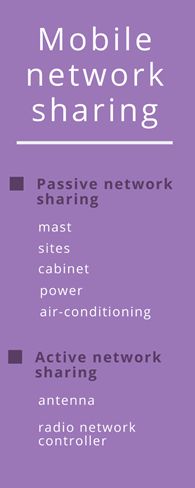The Turkish Competition Authority ("TCA") granted exemption to an agreement which allows mobile network operators ("MNO") to cooperate at the infrastructure level. Three MNOs1 which cover the whole mobile network market had filed an exemption application to the TCA in 2018 and the exemption decision has published lately on the TCA's website2. The scope of the agreement includes sharing passive elements of network infrastructure such as sites, cabinet, power, air-conditioning, etc3.

Actually, there are sector specific regulations that allow MNOs to share their passive network elements in order to reduce cost and avoid duplications. However, these regulations are based on meeting the formal requests of the operators and lack of details in terms of implementation. As mentioned by the MNOs such a structure creates uncertainties and demotivate the parties to cooperate. Moreover, the regulations are based on individual requests of the operators and they have to file a formal request for each need. This indicates high transaction costs considering the requests for thousands of base stations. Thus, the agreement in question aims to configure the sharing processes in order to reduce transaction costs and eliminate uncertainties.
While evaluating the notified agreement, the TCA followed the process of the individual exemption assessment. As in the European Union competition law, restrictive agreements qualify for exemption if their benefits to general welfare outweigh their restrictive effects on competition. The main considerations are based on product improvement, technical or economic progress and benefits to consumer.

The TCA states its main concern as a possible restriction of competition at the horizontal level. Since the three MNOs cover the whole mobile market, cooperation at the infrastructure level may increase the buyer power against the site owners or landlords etc. and give rise to coordinated behaviors. The market power of the MNOs and legal and economic barriers for entry are also specified as significant factors for a possible restriction of competition in the market.
However, despite these concerns the TCA takes into account the significant efficiency arguments that can be assured by the agreement. The primary evaluation of the TCA signifies that the cost of passive network elements constitutes almost half of the total network costs. Thus, a sharing arrangement subject to the passive network elements have a potential to increase cost efficiency. In particular, the TCA makes a detailed assessment and compares the CAPEX (capital expense) and OPEX (operating expense) with and without passive sharing arrangement. It determines that the agreement has a potential to increase the efficiency in the market.
In its assessment for CAPEX, the TCA puts that despite the additional development expenditures by the host operator, usage of other operators without bearing this investment costs may cut down the total capital expenditures. On the other hand, the significant efficiency gain is expected through the OPEX. The TCA emphasizes that the agreement results in rationalization of operational cost due to reserves produced by sharing site rent and power expenses. Recently, beside the increasing need for more base station, environmental concerns related to electromagnetic exposure make harder to find adequate sites especially in metropolitan areas. Thus, such an agreement not only gives opportunity to share the site rent but also decreases the pressure on the demand of site.
In summary, despite its concerns related with horizontal coordination, the TCA decided that the agreement in question meets the exemption requirements. Hence, lack of progress in infrastructure sharing between the MNOs has been removed to some extent. We wish the agreement will lessen pressure of network rollout costs of MNOs and allocate their resources on innovative services.
Footnotes
1 Vodafone Telekomünikasyon A.Ş., Turkcell İletişim Hizmetleri A.Ş. and Turk Telekom Mobil İletişim Hizmetleri A.Ş.
2 TCA decision numbered 19-15/203-90 and dated 11.04.2019. Accessed on 17.10.2019, Accessed on 17.10.2019, https://www.rekabet.gov.tr/Karar?kararId=17d14084-75fe-469f-bbb4-48534c87e073.
3 Passive sharing is defined as sharing of the passive elements of network infrastructure (mast, sites, cabinet, power, air-conditioning). Active sharing is defined as the sharing of active elements in the radio access network (e.g. antenna, radio network controller (RNC)). National roaming is considered as a form of active sharing. (Source: BEREC (2018). Report on infrastructure sharing. Accessed on 17.10.2019, https://berec.europa.eu/eng/document_register/subject_matter/berec/download/0/8164-berec-report-on-infrastructure-sharing_0.pdf.)
The content of this article is intended to provide a general guide to the subject matter. Specialist advice should be sought about your specific circumstances.


